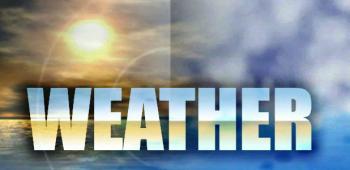
Hard freeze expected by mid-week
From staff reports
The line of showers and thunderstorms that drenched Acadia Parish Friday night and Saturday moved out of the area Saturday night, leaving in its wake a cold front with temperatures expected to reach freezng — and below — this week.
Sunday and Monday saw highs in the low 50s and lows dipping to around the freezing mark, according to Tim Humphrey, a meteorologist with the National Weather Service in Lake Charles.
Humphrey said the forecast for the rest of the week calls for a brief stint of “seasonable conditions” beginning today (Tuesday), with temperatures climbing into the 60s before falling back into the low 40s to upper 30s tonight.
Temperatures are expected to remain in the 40s — possibly reaching 50 — during the day Wednesday before dropping into the mid- to lower 20s Wednesday night.
Not much of a warming trend is expected Thursday with temperatures hard-pressed to get out of the 30s before falling back into the 20s again that night.
Acadia Parish Director of Homeland Security Lee Hebert said last year was one of the stranger winters he could recall.
With most of his “emergency work” coming from helping residents through hurricane seasons, Hebert said hefound himself having to educate parish residents to the dangers of freezing weather.
The Acadiana area had five ice storms last year.
“Yeah, that was strange,” he said.
Though no precipitation is forecast for the upcoming week, Hebert warned that if any should come, the best advice to follow would be,“Stay home.”
“Another thing people should avoid is using their ovens to heat their homes,” he said. “When I was working as a fireman we saw several fires start in such a scenario.”
Hebert also warned about being careful when using space heaters.
“People should be careful to make sure that materials such as towels or clothing are clear of the heater,” he said.
The Red Cross also offers the following tips for staying warm and safe during freezing weather:
• Wear layers of lightweight clothing to stay warm. Gloves and a hat will help prevent loss of body heat.
• Don’t forget pets — bring them indoors. If they can’t come inside, make sure they have enough shelter to keep them warm and that they can get to unfrozen water.
• Protect pipes — run water, even at a trickle, to help prevent your pipes from freezing. Open the kitchen and bathroom cabinet doors to allow warmer air to circulate around the plumbing (be sure to move any harmful cleaners and household chemicals out of the reach of children) and keep the garage doors closed if there are water lines in the garage.
• Keep the thermostat at the same temperature day and night. The heating bill may be a little higher, but you could avoid a more costly repair job if your pipes freeze and burst.
• If using a space heater, place it on a level, hard surface and keep anything flammable at least three feet away — things such as paper, clothing, bedding, curtains or rugs.
• Turn off space heaters and make sure fireplace embers are out before leaving the room or going to bed.
• Never use a stove or oven to heat your home.
• If you are using a fireplace, use a glass or metal fire screen large enough to catch sparks and rolling logs.
- Log in to post comments
